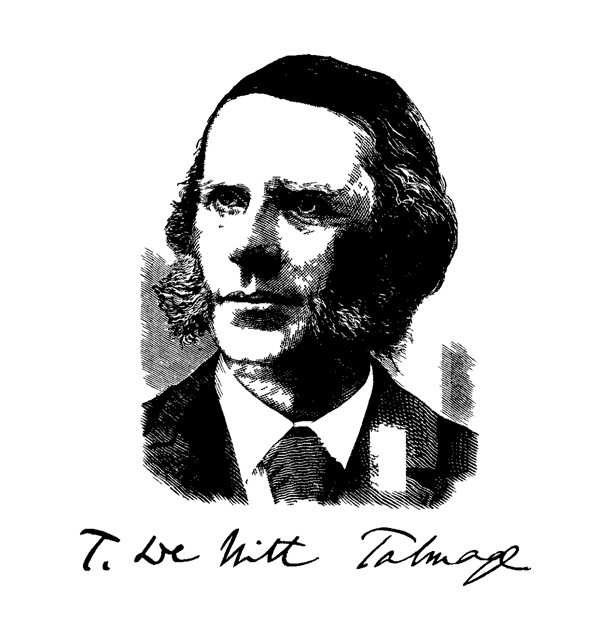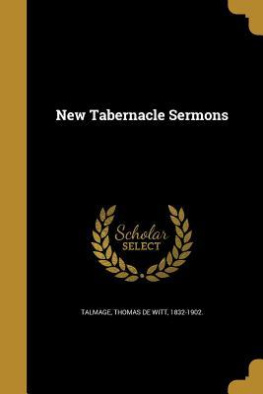Project Gutenberg's New Tabernacle Sermons, by Thomas De Witt Talmage
This eBook is for the use of anyone anywhere at no cost and with
almost no restrictions whatsoever. You may copy it, give it away or
re-use it under the terms of the Project Gutenberg License included
with this eBook or online at www.gutenberg.org
Title: New Tabernacle Sermons
Author: Thomas De Witt Talmage
Release Date: November 24, 2004 [EBook #14139]
Language: English
*** START OF THIS PROJECT GUTENBERG EBOOK NEW TABERNACLE SERMONS ***
Produced by Curtis Weyant, Jeannie Howse and the PG Online Distributed
Proofreading Team.
NEW TABERNACLE SERMONS
by
T. DE WITT TALMAGE, D.D.
Author Of "Crumbs Swept Up," "The Abominations Of Modern Society," etc.
Delivered in the Brooklyn Tabernacle.
VOL. I
New York:
George Munro, Publisher,
17 To 27 Vandewater Street.
1886.

T. De Witt Talmage
Entered according to Act of Congress, in the year 1885, by
George Munro ,
in the Office of the Librarian of Congress, Washington, D.C.
CONTENTS.
| Page |
| 7 |
| 21 |
| 34 |
| 45 |
| 59 |
| 72 |
| 83 |
| 95 |
| 108 |
| 119 |
| 134 |
| 147 |
| 158 |
| 171 |
| 184 |
| 197 |
| 209 |
| 221 |
| 233 |
| 246 |
| 259 |
| 274 |
| 285 |
| 297 |
| 311 |
| 325 |
| 339 |
BRAWN AND MUSCLE.
"And Samson went down to Timnath." Judges xiv: 1.
There are two sides to the character of Samson. The one phase of his life, if followed into the particulars, would administer to the grotesque and the mirthful; but there is a phase of his character fraught with lessons of solemn and eternal import. To these graver lessons we devote our morning sermon.
This giant no doubt in early life gave evidences of what he was to be. It is almost always so. There were two Napoleonsthe boy Napoleon and the man Napoleonbut both alike; two Howardsthe boy Howard and the man Howardbut both alike; two Samsonsthe boy Samson and the man Samsonbut both alike. This giant was no doubt the hero of the playground, and nothing could stand before his exhibitions of youthful prowess. At eighteen years of age he was betrothed to the daughter of a Philistine. Going down toward Timnath, a lion came out upon him, and, although this young giant was weaponless, he seized the monster by the long mane and shook him as a hungry hound shakes a March hare, and made his bones crack, and left him by the wayside bleeding under the smiting of his fist and the grinding heft of his heel.
There he stands, looming up above other men, a mountain of flesh, his arms bunched with muscle that can lift the gate of a city, taking an attitude defiant of everything. His hair had never been cut, and it rolled down in seven great plaits over his shoulders, adding to his bulk, fierceness, and terror. The Philistines want to conquer him, and therefore they must find out where the secret of his strength lies.
There is a dissolute woman living in the valley of Sorek by the name of Delilah. They appoint her the agent in the case. The Philistines are secreted in the same building, and then Delilah goes to work and coaxes Samson to tell what is the secret of his strength. "Well," he says, "if you should take seven green withes such as they fasten wild beasts with and put them around me I should be perfectly powerless." So she binds him with the seven green withes. Then she claps her hands and says: "They comethe Philistines!" and he walks out as though they were no impediment. She coaxes him again, and says: "Now tell me the secret of this great strength?" and he replies: "If you should take some ropes that have never been used and tie me with them I should be just like other men." She ties him with the ropes, claps her hands, and shouts: "They comethe Philistines!" He walks out as easily as he did beforenot a single obstruction. She coaxes him again, and he says: "Now, if you should take these seven long plaits of hair, and by this house-loom weave them into a web, I could not get away." So the house-loom is rolled up, and the shuttle flies backward and forward and the long plaits of hair are woven into a web. Then she claps her hands, and says: "They comethe Philistines!" He walks out as easily as he did before, dragging a part of the loom with him.
But after awhile she persuades him to tell the truth. He says: "If you should take a razor or shears and cut off this long hair, I should be powerless and in the hands of my enemies." Samson sleeps, and that she may not wake him up during the process of shearing, help is called in. You know that the barbers of the East have such a skillful way of manipulating the head to this very day that, instead of waking up a sleeping man, they will put a man wide awake sound asleep. I hear the blades of the shears grinding against each other, and I see the long locks falling off. The shears or razor accomplishes what green withes and new ropes and house-loom could not do. Suddenly she claps her hands, and says: "The Philistines be upon thee, Samson!" He rouses up with a struggle, but his strength is all gone. He is in the hands of his enemies.
I hear the groan of the giant as they take his eyes out, and then I see him staggering on in his blindness, feeling his way as he goes on toward Gaza. The prison door is open, and the giant is thrust in. He sits down and puts his hands on the mill-crank, which, with exhausting horizontal motion, goes day after day, week after week, month after monthwork, work, work! The consternation of the world in captivity, his locks shorn, his eyes punctured, grinding corn in Gaza!
I. First of all, behold in this giant of the text that physical power is not always an index of moral power. He was a huge manthe lion found it out, and the three thousand men whom he slew found it out; yet he was the subject of petty revenges and out-gianted by low passion. I am far from throwing any discredit upon physical stamina. There are those who seem to have great admiration for delicacy and sickliness of constitution. I never could see any glory in weak nerves or sick headache. Whatever effort in our day is made to make the men and women more robust should have the favor of every good citizen as well as of every Christian. Gymnastics may be positively religious.
Good people sometimes ascribe to a wicked heart what they ought to ascribe to a slow liver. The body and the soul are such near neighbors that they often catch each other's diseases. Those who never saw a sick day, and who, like Hercules, show the giant in the cradle, have more to answer for than those who are the subjects of life-long infirmities. He who can lift twice as much as you can, and walk twice as far, and work twice as long, will have a double account to meet in the judgment.
How often it is that you do not find physical energy indicative of spiritual power! If a clear head is worth more than one dizzy with perpetual vertigoif muscles with the play of health in them are worth more than those drawn up in chronic "rheumatics"if an eye quick to catch passing objects is better than one with vision dim and uncertainthen God will require of us efficiency just in proportion to what he has given us. Physical energy ought to be a type of moral power. We ought to have as good digestion of truth as we have capacity to assimilate food. Our spiritual hearing ought to be as good as our physical hearing. Our spiritual taste ought to be as clear as our tongue. Samsons in body, we ought to be giants in moral power.



